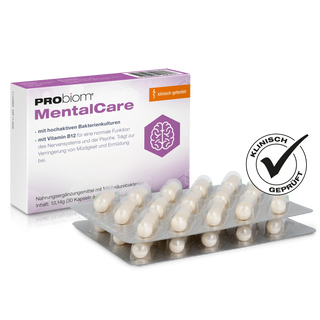In our hectic, performance-oriented society, sleep is often viewed as a luxury—something we sacrifice in order to achieve more, experience more, or be more productive. But science agrees: sleep is not something we can do without. Quite the opposite—sufficient sleep is a cornerstone of our physical and mental health. But what actually happens when we don't get enough sleep? What symptoms occur with sleep deprivation, and how does this condition manifest itself? In this article, we examine the effects of sleep deprivation in all its facets—physical, psychological, and emotional.
What is sleep deprivation?
Before we address the symptoms, it's helpful to define what "insufficient sleep" actually means. While the ideal amount of sleep varies from individual to individual, according to experts (such as the National Sleep Foundation and the German Society for Sleep Research), adults need an average of 7–9 hours of sleep per night. Anyone who consistently falls below this recommendation is suffering from sleep deprivation—acute or chronic.
-
Acute sleep deprivation: One or more nights with significantly less sleep than necessary.
-
Chronic sleep deprivation: Persistent sleep deficits over weeks, months, or even years.
Physical symptoms of sleep deprivation
a) Weakening of the immune system
Even a single night of poor or insufficient sleep can impair your immune system. Studies show that the production of immune cells and antibodies occurs during sleep. Sleep deprivation increases susceptibility to infections such as colds or flu.
b) Headaches and migraines
Many people report tension headaches after sleep-deprived nights. Migraine sufferers also experience attacks more frequently when sleep deprived. The connection is explained by neurological changes in the brain that occur with sleep deprivation.
c) Cardiovascular problems
Long-term sleep deprivation can contribute to high blood pressure, cardiac arrhythmias, and an increased risk of heart attacks or strokes. Nighttime rest is important for the cardiovascular system to regenerate.
d) Weight gain
Lack of sleep affects hormone levels: The "hunger hormone" ghrelin is produced in greater quantities, while the "satiety hormone" leptin decreases. This leads to cravings—especially for high-calorie, carbohydrate-rich foods. At the same time, energy consumption decreases due to less exercise and a slower metabolism.
e) Reduced physical performance
Muscle building, regeneration, coordination – all of these suffer from insufficient sleep. Athletes in particular notice the negative effects, as the body doesn't have enough time to recover and regenerate.
Psychological and cognitive symptoms
a) Difficulty concentrating and forgetfulness
The brain needs sleep to process information and transfer it into long-term memory. Sleep deprivation makes it difficult to concentrate, structure tasks, or remember what has been learned. Short-term memory suffers, especially.
b) Irritability and emotional instability
Even a short night's sleep is enough to disrupt emotional stability. People become more easily irritable, emotionally overwhelmed, or moody. The limbic system (especially the amygdala), which is responsible for emotional reactions, overreacts when sleep deprived.
c) Depressive moods and anxiety
Chronic sleep deprivation is a risk factor for mental illness. Studies show that sleep deprivation can be both a cause and a symptom of depression and anxiety disorders. People who suffer from persistently poor sleep often feel listless, hopeless, or restless.
d) Hallucinations and loss of reality
Extreme sleep deprivation (several days without sleep) can lead to hallucinations, delusions, or even psychosis. The perception of reality becomes distorted, reminiscent of an acute mental health crisis.
Social and professional consequences
Lack of sleep not only affects the body and mind, but also social life and professional performance.
a) Wrong decisions and declining productivity
People who are deprived of sleep are prone to making mistakes, poor decisions, and poor judgment. In jobs with high levels of responsibility—for example, in the medical or technical fields—this can have fatal consequences.
b) Interpersonal problems
Irritability, bad moods, and a lack of empathy often lead to conflicts with colleagues, partners, or friends. Our empathy also declines—we find it harder to empathize with others.
Long-term health risks
Those who consistently lack sleep risk serious health problems.
-
Type 2 diabetes: Lack of sleep impairs insulin sensitivity and can promote the development of diabetes.
-
Cancer: Some studies suggest a link between chronic sleep deprivation and an increased risk of cancer (e.g. breast or colon cancer).
-
Dementia and Alzheimer's: Sleep is important for "cleaning" the brain. Waste products such as beta-amyloid (associated with Alzheimer's disease) are better removed during sleep.
Warning signs – How to recognize sleep deprivation
Many people live with a sleep deficit without really being aware of it. Precisely because the symptoms develop gradually and are often confused with other factors (e.g., stress, diet, weather), it's important to pay attention to certain warning signs. The body and mind send clear signals – you just have to interpret them correctly.
Constant tiredness – even during the day
If you regularly feel tired in the morning or struggle with bouts of fatigue throughout the day, this could indicate too little or poor sleep.
Microsleep and “blackouts”
Sudden dozing off for a few seconds, especially during monotonous activities or while driving, is a serious warning sign of fatigue.
Concentration and attention disorders
Forgetfulness, mental absent-mindedness, or difficulty concentrating on a task are typical symptoms of an overwhelmed brain in sleep-deprived mode.
Emotional irritability
Irritability, nervousness or mood swings occur more frequently in people who have not had enough sleep – often without a clearly identifiable cause.
Cravings for sugar and caffeine
An increased need for coffee, energy drinks or sweets often indicates an energy deficit that the body is trying to compensate for.
Weak immune system
Frequent infections, longer recovery periods and persistent fatigue can be an indication of a weakened immune system due to lack of sleep.
Pale complexion and dark circles under the eyes
Visual signs such as pale skin, dry complexion or dark circles under the eyes are visible consequences of a lack of rest.
Loss of libido
A decrease in sexual desire or hormonal irregularities (e.g. during menstruation) can be related to a disturbed sleep-wake rhythm.
lack of motivation
A persistent feeling of “I can’t go on” or a lack of motivation, even for leisure activities, is often not a sign of laziness, but of exhaustion.
Difficulty falling asleep or staying asleep
Ironically, lack of sleep can also disrupt sleep itself: those who are constantly tired but still cannot rest are often stuck in a vicious circle.
Conclusion: Sleep is not a waste of time
Modern people often need to remind themselves how important sleep is for their well-being. Sleep deprivation isn't just a harmless side effect of stressful times—it can have serious health consequences.
Anyone who regularly suffers from poor sleep should analyze the causes and take targeted countermeasures. This can be achieved through improved sleep hygiene, reducing stress, or—if necessary—seeking professional help for sleep disorders.
Tip:
Keep a sleep diary, monitor your daily routine, and pay attention to recurring patterns. Making small changes to your daily routine often helps—for example, reducing screen time, establishing a regular bedtime, or developing evening rituals.
Because good sleep is not a luxury – it is a necessity.













